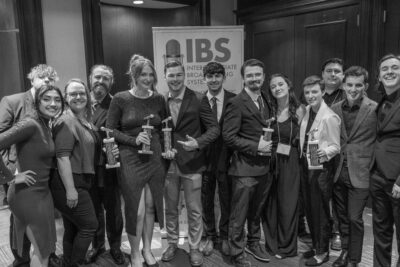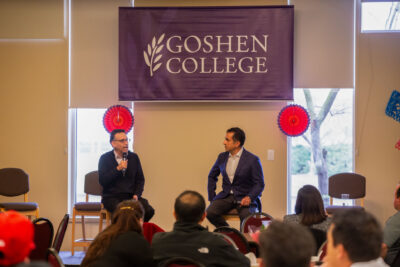Millions of people across the globe gathered to march in support of women, with Goshen College students in the midst.
The main march was in Washington D.C., with sister marches across the nation and in other countries including France, India and even Antarctica. These marches are estimated to have been the biggest march in U.S. history with nearly 2.9 million people gathering in the U.S. alone. Students from GC were able to attend the marches in D.C, Indianapolis, South Bend and Chicago.Among the students who went to D.C. were Lena Charles and Katie Hurst, both juniors.
“I have always had such strong beliefs about so many of the issues that this march was encompassing,” Charles said, “and I wanted to really be there to soak it all in.”
Hurst said that it was disheartening to see unrest before the rally had ended, as people wanted to march.
“I hope that, as white women, we continue to realize that we have showed up a little late to the game in supporting our black sisters, our native sisters, our immigrant sisters and our LGBTQIA+ community,” she said. “For right now, our role is to show up, to stand with [our sisters] and to listen.”
Maddie Birky and Morgan Short, seniors, both attended a sister march in Indianapolis.
“I’m originally from Indiana, where our new Vice President is from, so it felt important for me to attend a sister rally in my home state,” said Birky. “It wasn’t quite all that I expected it to be, but there was a powerful feeling of comradery among the people there that was really special.”
Short and Birky were able to attend the march with 15 other students and five community members, as well as Beth Martin Birky, professor of English and women and gender studies.
“I have felt the need to participate more in my community and the greater U.S within the governmental realm,” Short said. “At the rally, this sense of positivity was shared through a sense of hope among all the leaders and attendees.”
Short saw the rally as filled with compassion, resistance and love through the various speeches and performers, as well as attendees.
“The biggest gain I had from this experience was the re-igniting a sense of hope in humanity,” she said.
Several students were able to attend the March on Chicago, including Dona Park, Andrew Pauls and Christi Sessa.
“I think one of the reasons for my participation was to share a collective experience with Goshen women,” said Park, a senior. For her, walking, singing and chanting together was a sacred thing that does not happen often.
“I was extremely curious to see what the demographics of the march would be,” she said. “I also wanted to explain to my classmates why this mattered to me, as a minority and an immigrant, but also growing up both in the States and in Canada.”
Pauls, a senior, went to the Chicago march because his housemates were going. He wasn’t sure what to expect and was surprised by how many people were there.
“I hope that the presence of the marchers leads to more awareness of the voices who want to be heard,” he said. “This march is a sign that a great deal of people care enough about vulnerable people in society to gather together and shout it to the world, and I hope the Trump presidency does not take that lightly.”
Sessa, a sophomore, felt as though people were united and would not be defeated.
“There were moments where I was leading chants, and in those moments I felt like I was on fire.” Sessa said. “It was amazing.”
Sessa hopes that moving forward, people continue to practice loving one another after these marches.
The Women’s March on Washington committee is now working to launch a new campaign. They hope to take action in 10 different ways over the next 100 days.
The first action encourages people to write postcards to their local senators about what matters most to them. The Women’s March website has postcards that people can download and fill out themselves.
The website also encourages people to sign up for updates on the next steps in their campaign.

